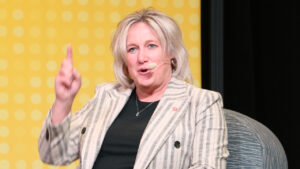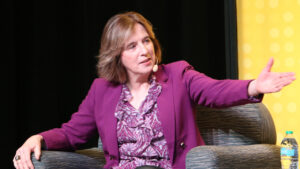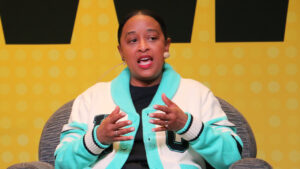Generating superstars like Caitlin Clark have fueled an explosive increase in the importance of women’s sports in athletic and economic spheres, and it is important that the movement strikes while Relexic Iron is hot, speakers said in a discussion of the “Business of Women’s Sports Sports” panel at Iowa University.
About 200 people participated in the discussion, organized by the UI Business College in the main Lounge of the Iowa Memorial Union.
The speakers included Anne Nizzi-Clang, Mrs. Clark’s mother and Caitlin Clark Foundation Director; Amy Wilson, managing director of NCAA involvement, who gained a Ph.D. in health and sport studies by the University of Iowa; Carol Stiff, President and Chairman of the Board of the Sports Network of young women; and Jocelyn Monroe, Vice President and Marketing Director for Kansas City City of the National Women’s Football League (NWSL).
The discussion was moderated by Kathryn Reynolds, a Panel of Tippie Business College and President/Commissioner of the Northwods League Softball, as well as a former member of the Iowa Basketball Training staff and a current radio analyst for Learfield Sports, where she covers the women’s basketball team.

Ms Wilson opened the discussion by highlighting the heritage of Dr. Christine Grant, the first female athletic director at the University of Iowa, who passed away in 2021 at the age of 85.
Ms. Grant made considerable and sustainable contributions to women’s sports, including the start of women’s sports Varsity and the leadership of the Association for Intelligence for Women. It was responsible for “building a Iowa excellence program” and became a well -known national export in Title IX, Federal Civil Rights Law that prohibits discrimination based on schools and other educational programs receiving federal funding.
“And it was not just about winning,” said Mrs. Wilson, who worked closely with Ms. Granta in Iowa for nearly two decades on net capital issues in intelligence athletics. “It was also about giving young women the opportunity to achieve their full potential and to flourish in their time here. What she has done here in Iowa, in many ways, is a legacy that will be remembered forever.”
No one in American sports was a more prominent IX title expert than Mrs. Grant, said Ms. Wilson.
“If we had $ 1 for every person she learned how the IX Athletics Title works, we could build a whole new building here on campus,” she said. When you heard him talk about Title IX, you can literally hear a pin drop in the room. People knew she had facts, she knows she was talking. And her message was this: Are we really making progress? Are we really seeing girls and women get to where they should be in sports? “
Ms Wilson also discussed the “home solution”, a lawsuit against NCAA appointed to the former Grant House College. As part of a proposed claim of the lawsuit, former men’s college of men and women playing between June 2016 and September 2024 are set to receive more than $ 2.8 billion in the next 10 years, as part of an argument that they did not receive the “right part” of college sports during their play careers. A recent settlement decision is scheduled for April 7.
“I think there are some good things that can get out of the solution,” Ms Wilson said. “Actually removes the borders of the scholarships, so I think in many schools, women can actually end up taking more scholarships.”
Ms. Nizzi-Clanc said the Clark family tried to maintain an moderately normal family life like Caitlin Clark, whose two brothers are also athletically active, increased to importance.
Working nearly three decades in the development and marketing of products, Ms. Nizzi-Kllar said she was very aware of the need to hold the wings that continued to come on her way.
“I was listening to what businesses were starting to think about,” Mrs. Nizzi-Clanci said. “We simply [said] ‘Caitlin, you need to start your business. And she’s like, ‘Yes, I’m sure it should’. What was really important to us is that she had ownership. This was her journey, and that was extremely important for us to make it really clear. She is the sole owner of her company, and she is CEO. Even before I came here tonight to speak, I had to call the boss and say now, with this opportunity, she has to check the box and say, ‘Yes, we will do it.’ We really try to teach her that she is a business leader, and that has been a great environment for her to learn for sure how to run a business and how to be a great leader. “
Even when visiting lawyers and accountants, Ms. Nizzi-Kllar said she sought to maintain the advantages of Caitlin focused on school and basketball, but business issues were always part of the family formula. Even as a team of trusted councilors formed about Caitlin to keep her jobs in order, it was important that Caitlin’s business was a reflection of its values and goals.
“It’s a difficult balance for you as a parent, knowing everything that is going with business,” she said. “But I didn’t want to be just the business partner (her). I wanted to be (she) Mom. I wanted our phone calls to talk about what was happening and how she was doing. We set up a weekly meeting that was business, and when we addressed all the situations, so the next conversation could be about it as a person.”

Ms Stiff worked at ESPN for 31 years, increasing the profile of women’s sports in the world’s largest sports network, and now consults with brands and organizations trying to support women’s sports through her company, Stiff Sports Media Consulting.
She also discussed the challenges and successes of the start of the women’s sports network, the first channel supported by advertising dedicated to women’s sports, including broadcasting partnerships with the Northwoods Softball League and the National Women’s Football League.
She said businesses are continuing to devote more financial resources to female athletes’ approval and women’s sports advertising, because they are increasingly seeing the value of those investments.
“Regarding advertising, I still do not understand why an advertiser would not want to be associated with a female athlete staying in college, graduates, again giving to society, signs many autographs,” Ms Stiff said. “On a thing that has been missing in women’s sports, but we are finally starting to see it, and we’re seeing it from the big corporations.”
While women’s professional leagues continue to go to sports such as football and basketball, now is the time to exploit the potential of female sneakers in general, Mrs Stiff said.
“People had better rode on the boat,” she said. “Time is now, and you can enter and advance.”

Ms. Monroe noted that a new stadium for the women’s football team she represents, Kansas City City, opened in March 2024 as the first sports facility dedicated exclusively to a single professional team of women. It is a critical development for the legitimacy of women’s sports, which has historically had to share facilities with one or more other teams.
“Everyone professional women’s sports team has to wait to have their own home and their space,” Ms. Monroe said. She told the story of a 19-year-old team member who is playing in her first professional season, “Who knows nothing else”, and another player who recently retired and “spent the whole trip”.
“To have those two people walking in their closet room for the first time and simply be able to remove their bags, see their names in their closet – this is what any professional, male or female athlete deserves,” she said. “It’s been an amazing trip for us.”
Panelists also discussed a number of other opportunities, including the emergence of new NCAA women sports such as wrestling and flag football, and NCAA negotiations for a new contract with ESPN, which will triple the coverage of women’s sports network.
Ms. Nizzi-Clanc also discussed the CAITLIN Clark Foundation’s efforts for both a national and local level, including the latest $ 22,000 donations to a number of Iowa City area organizations as part of the latest ceremony celebrating the Jersey Pension of Caitlin Number 22.
Ms. Monroe said broad -based support will be required for women’s sports to continue her transcendent growth curve.
“We need our male fans to be there too,” she said. “For that long, it was just the women who did their sport. But we are offering a great product, and we need the whole base of the fans to be part of this whole economic system that supports women’s sports because it continues to grow and reinvest. “
The discussion on the panel was presented with support from the Fund of Women’s Hand/Tippie Leadership, Fund Natalie Costello, Pearson Leadership Lecture Series and Bowen Lecture Series.